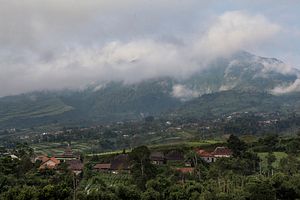Indonesia has the largest Muslim population in the world. Every year, Muslims fast during the holy month of Ramadan. They abstain from eating, drinking, smoking and having sex from dawn to dusk.
Two weeks before Ramadan, Javanese Muslims held what’s known as the Nyadran ritual, a tradition of cleaning and praying at their ancestors graves. The ritual blends local culture and Islamic traditions. Each year, villagers who live on the slopes of Mount Merapi and Merbabu, Boyolali, Central Java, Indonesia conduct the ritual. Thousands of people from 15 villages hold the ritual in turns at each village cemetery.
There are many stories and versions related to this tradition, one of which is a philology study which mentions that Nyadran comes from Sanskrit word, namely “Sradha.” The term used by Hindus for a ritual performed for a person’s ancestral spirits by means of a tomb pilgrimage.
The local villagers start the ritual by cleaning the cemetery. They then proceed with praying for their deceased families and relatives. The ritual varies by place, but generally includes readings from some parts of the Quran.
When villagers come to the cemetery, they bring various of foods and arrange them neatly in bamboo or aluminum containers, called Tenong. The food includes snacks, traditional cakes and fruit. After praying, the food is eaten together.
The Nyadran tradition contains cultural values and togetherness to enhance harmony among religious people. Not only Muslims who welcome Ramadan, but also followers of other religions such as Christianity. All are tied together by traditions.
Agoes Rudianto is a Jakarta-based independent photographer.















































